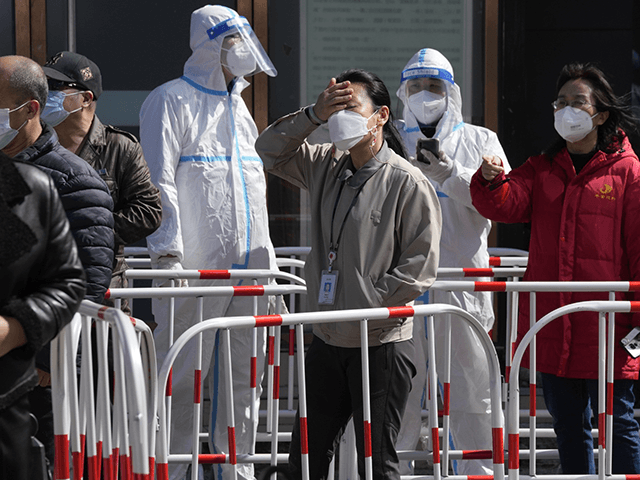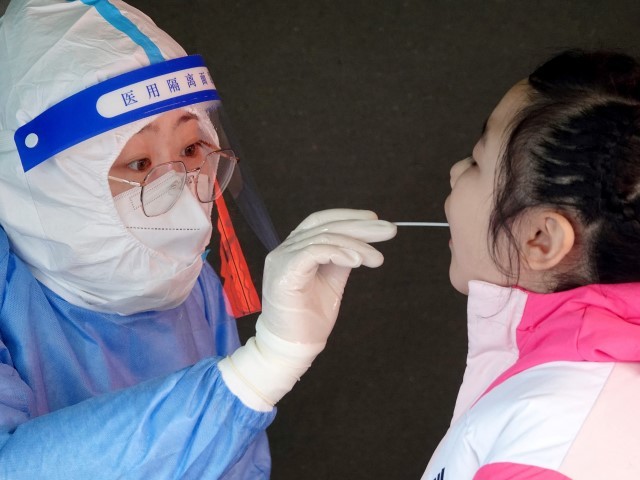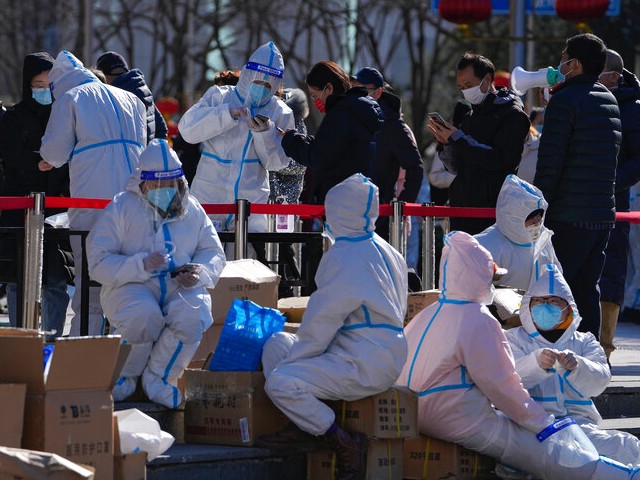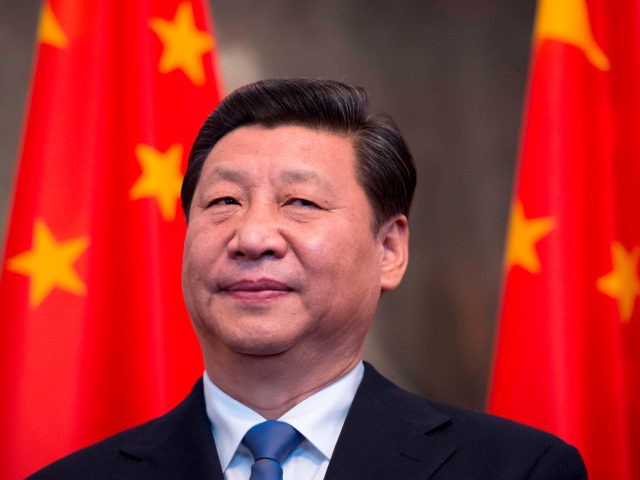Chinese dictator Xi Jinping ended months of silence on the growing Chinese coronavirus crisis in his country on Thursday, presiding over a Politburo meeting in which he reportedly demanded the country not abandon its strict lockdown policy to fight the surge in cases.
Chinese officials admitted this week that 28 of its 31 provinces, in addition to the formerly autonomous city of Hong Kong, were experiencing uncontrolled spread of coronavirus infections causing major disruption to health care and daily life for residents. While lockdowns in southern Shenzhen, a technology hub on the border with Hong Kong, prompted the most international attention, China has been locking down major metropolitan areas like Xi’an since late last year over its inability to contain the local epidemic.
Government media reports, citing Communist Party health “experts,” have insisted in the past week that the vast majority of documented coronavirus cases consist of mild or asymptomatic disease, a claim at odds with the intense efforts to quarantine citizens and limit overburdening the healthcare system.
In northern Jilin province, for example, Beijing boasted that it rapidly constructed a “makeshift hospital” this week to address heightened demand from coronavirus patients, who are supposedly experiencing, at worst, mild symptoms.
China mandates testing in areas with suspected high volumes of transmission and does not legally allow individuals with mild or asymptomatic cases to treat their disease at home.

Workers line up for COVID test outside an office building on Monday, March 14, 2022, in Beijing. Chinese authorities reported more than 1,300 locally transmitted cases of COVID-19 across dozens of mainland cities Monday. (AP Photo/Ng Han Guan)
Chinese government media coverage of the crisis notably omitted any mention for months of Xi Jinping responding to the crisis with any action, instead crediting him for unspecified “insights” that improved the situation. Despite his near-total stranglehold on power in the country, Xi instead limited himself to commenting on international issues, most recently involving himself in the ongoing war between Russia and Ukraine.
The state-run Xinhua News Agency reported on Thursday that Xi urged Politburo leaders to embrace lockdowns “to curb the spread of the epidemic soonest.”
“More effective measures should be taken to achieve maximum effect in prevention and control with minimum cost, and to reduce the impact on socioeconomic development as much as possible, said Xi,” according to Xinhua. “Noting the recent local [Chinese coronavirus] cluster transmissions appeared in many places in the country, with broad coverage and frequent occurrences, the meeting called for stringent implementation of the policy of early detection, reporting, quarantine and treatment.”
Xi appeared to threaten Communist Party officials who did not observe “strict implementation” of quarantine and other limitations with being purged from power.
“In regions where the epidemic hit, officials at all levels must consider epidemic prevention and control their top priority and put their utmost effort toward the successful containment of the virus, the meeting underscored,” Xinhua reported. “Officials who have lost control of the epidemic due to dereliction of duty must be investigated immediately following discipline and regulations, the meeting added.”
Despite the forceful demand to adhere to an emergency response plan that belies a grave situation on the ground, Xi also reportedly declared victory against the coronavirus pandemic yet again; Xi initially claimed China had defeated the disease in March 2020.

A child undergoes a nucleic acid test for the Covid-19 coronavirus in Yantai, in China’s eastern Shandong province on March 14, 2022. – China OUT
“The country’s economic performance and [Chinese coronavirus] response, which both led the world, fully demonstrated its strength and capacity in epidemic prevention and control,” Xinhua paraphrased Xi as saying. “It also showed the advantages of the CPC’s [Communist Party] leadership and the socialist system.”
The Global Times, another state propaganda outlet, cited “top epidemiologists” who breathlessly “hailed this meeting” for “injecting the much-needed ‘anchoring energy'” into China’s coronavirus response – an apparent admission that Xi had not provided sufficient leadership on the issue in the past.
“This meeting has injected the much-needed ‘anchoring energy’ into the current work to fight [Chinese coronavirus], as the country is fighting a hard battle against the highly contagious Omicron variant,” the newspaper paraphrased an anonymous alleged “expert from Chinese Center for Disease Control and Prevention (Chinese CDC)” as saying.
The Times claimed in the article, published Thursday, that some of the cities facing the most acute spread of Chinese coronavirus had already begun to see “quick declines,” citing Jilin in particular.
“Jilin, the province that recorded four-digit caseloads for four consecutive days, detected 742 confirmed cases on Wednesday,” the Times claimed, adding that a local expert estimated that 95 percent of Jilin cases are either asymptomatic or mild – again calling into question the need for a makeshift hospital.

Workers in protective suits take a rest as people line up to register during a mass COVID-19 test outside a shopping mall in Beijing, Tuesday, Feb. 22, 2022. (AP Photo/Andy Wong)
By Friday morning, the Global Times reported that cases in Jilin had “surged sharply” between Thursday and Friday and blamed local officials for the setback. After reporting 742 cases on Wednesday, the province reported 1,834 cases on Thursday.
A top Chinese official admitted this week that China’s coronavirus situation is currently “grim and complex,” even as state media outlets and Xi himself celebrated the alleged success of China’s extreme lockdown measures.
“[T]he current epidemic situation is grim and complex, making it difficult to prevent and control,” deputy head of China’s National Health Commission (NHC) Lei Zhenglong said on Tuesday.
“[The] Chinese mainland has reported more than 15,000 domestically-transmitted positive cases from March 1 to 14, affecting 28 provinces and regions.”

COMMENTS
Please let us know if you're having issues with commenting.